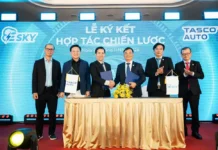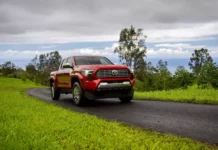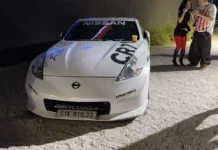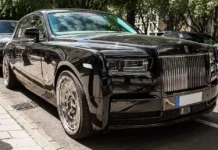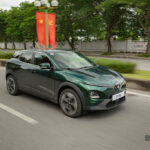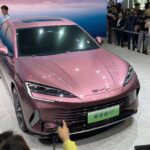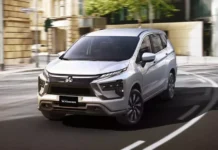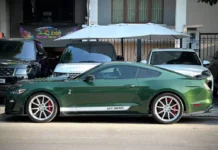For years, the Suzuki Super Carry Pro has been the default choice in Vietnam’s light truck segment. Its durable gasoline engine, simple and easy-to-repair design, high payload capacity, and ability to endure long-distance journeys have made it the undisputed leader in its category, with almost no rivals.
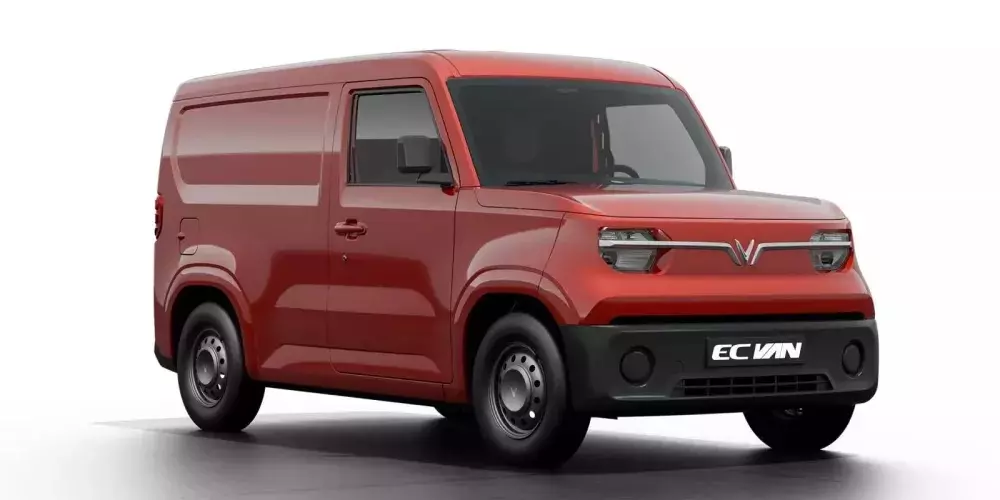
The newly launched VinFast EC Van.

Suzuki Super Carry Pro – VinFast EC Van’s direct competitor
The question arises: Is the VinFast EC Van just a temporary green publicity stunt or a serious and worthwhile consideration for small businesses that are constantly on the move? Let’s put the VinFast EC Van to the test and compare it with the Suzuki Super Carry Pro.
Small in Size, Big in Ambition
True to its name, the “E-City Van,” the VinFast EC Van is designed specifically for urban environments with its compact, agile, and maneuverable dimensions. At just 3.76 meters in length, it’s nearly 50 cm shorter than the Suzuki Super Carry Pro, making it effortless to turn in tight alleys, cramped parking lots, or inner-city sidewalks, where traditional trucks often struggle.
When it comes to cargo capacity, the VinFast EC Van holds its own. Despite being an electric vehicle, it can handle a payload of over 600 kg, suitable for transporting groceries, perishables, e-commerce deliveries, or small business supplies. Its 2,600-liter cargo volume, coupled with a closed cargo compartment design, is a significant advantage, protecting goods from sun, rain, and dust. This feature appeals to businesses requiring clean deliveries, dry goods transportation, or those wanting to avoid dust and moisture contamination. The VinFast EC Van is strategically targeting young startups, online retailers, and inner-city delivery services.
In contrast, the Suzuki Super Carry Pro is not solely designed for urban environments but rather as a multi-terrain workhorse. In other words, it’s capable of navigating both inner-city streets and long-distance journeys. With a length of nearly 4.2 meters, the Suzuki model offers a larger cargo area that can be customized with enclosed, tarpaulin, or refrigerated compartments, depending on business needs.

Suzuki Super Carry Pro is ideal for long-distance travel.
Its nearly one-ton payload capacity also makes it suitable for heavy, bulky, or high-volume cargo. When it comes to “cargo-focused, long-distance travel,” the Super Carry Pro remains the more practical choice.
Operating Costs: Electric Wins Hands Down
If we consider a vehicle as a long-term investment, operating costs become a critical factor. This is where the VinFast EC Van truly crushes its traditional competitor.
Let’s do a simple calculation. A small business covering an average daily distance of 100 km (a typical inner-city delivery route) in a Suzuki Super Carry Pro would consume approximately 8 liters of fuel per 100 km at a fuel price of 24,000 VND per liter. This equates to a daily fuel expense of 192,000 VND, excluding maintenance costs such as oil changes, spark plugs, air filters, and air conditioning repairs.
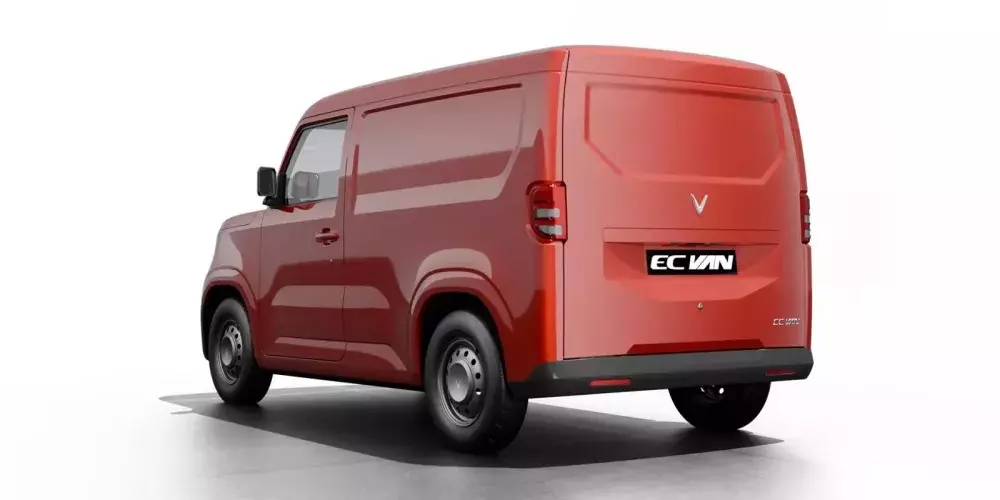
VinFast EC Van boasts lower operating costs.
For the same distance, the VinFast EC Van would consume only about 11-12 kWh of electricity, resulting in a daily cost of less than 40,000 VND if charged at home overnight. Moreover, electric vehicles require less frequent and simpler maintenance than traditional gasoline or diesel cars because they don’t have internal combustion engines, spark plugs, engine oil, or air filters. The EC Van’s battery is warranted for 7 years or 160,000 km, giving businesses peace of mind for at least half a decade.
In other words, the savings on fuel and maintenance over 2-3 years could amount to the cost of half a new vehicle.
Legal Compliance and the Right to Drive in the City
A crucial aspect often overlooked when comparing transport vehicles is urban traffic regulations.
The Suzuki Super Carry Pro, despite its small size, falls under the light truck category and is subject to restricted operating hours in cities. In Hanoi and Ho Chi Minh City, trucks are banned from entering the city center between 6 am-9 am and 4 pm-8 pm daily. Businesses operating during these restricted hours must obtain permits, which involve cumbersome procedures and additional periodic costs.
The VinFast EC Van, classified as an electric van with fewer than five seats, is not considered a truck. Consequently, it enjoys unrestricted access to urban areas at all times, without the need for permits or concerns about fines. For businesses delivering perishable goods requiring early morning or evening deliveries, this strategic advantage is invaluable.
Differing Product Philosophies and Brand Messages
Suzuki markets the Super Carry Pro as a workhorse, and rightly so. This model is all about practicality, durability, and reliability—traits that reflect the hardworking nature of its owners: quietly getting the job done without seeking the spotlight.
On the other hand, VinFast positions the EC Van not just as a vehicle but as a part of its “everyone deserves a green vehicle” message, inviting businesses to join the journey toward reduced emissions.
For small enterprises in the service, clean food, eco-friendly delivery, or ESG-oriented sectors, the image of an EC Van with their logo silently cruising emission-free through busy streets is a powerful brand statement that goes beyond operating costs.
Traditional vs. Pioneer: Who Wins, Who Loses?
To be fair, the Suzuki Super Carry Pro cannot be immediately replaced. In outlying areas with challenging terrain or for those requiring heavy loads and frequent long-distance travel, electric vehicles may not yet offer the same level of flexibility. While the VinFast EC Van’s 17 kWh battery is sufficient for a 150 km daily range, this figure assumes ideal conditions with no air conditioning and a flat, unladen route.
Additionally, the Suzuki Super Carry Pro has a proven track record in the market, assuring owners of its reliability and durability. This peace of mind regarding breakdowns, repairs, and maintaining delivery schedules and client trust is sometimes even more critical than fuel costs.
However, the VinFast EC Van aligns with the trends of urbanization, stricter emissions regulations, and the rapid development of charging infrastructure. VinFast’s expanding ecosystem of charging stations nationwide further strengthens the EC Van’s position.
The EC Van doesn’t need to outperform the Suzuki Super Carry Pro in every aspect; it merely needs to address a gap in the market, and VinFast seems to be on the right track.
A Shift in the Game
Vietnam’s small truck market has long been stagnant and dominated by traditional gasoline-powered vehicles. The introduction of the VinFast EC Van not only offers a fresh alternative but also signifies a shift in mindset from “trucks are for cargo” to “trucks as a reflection of a business’s identity.”
In this face-off, Suzuki represents the proven and familiar, while VinFast ushers in a challenging yet promising new era. The question is no longer “which vehicle is more powerful?” but rather, “which direction does your business want to take?”





